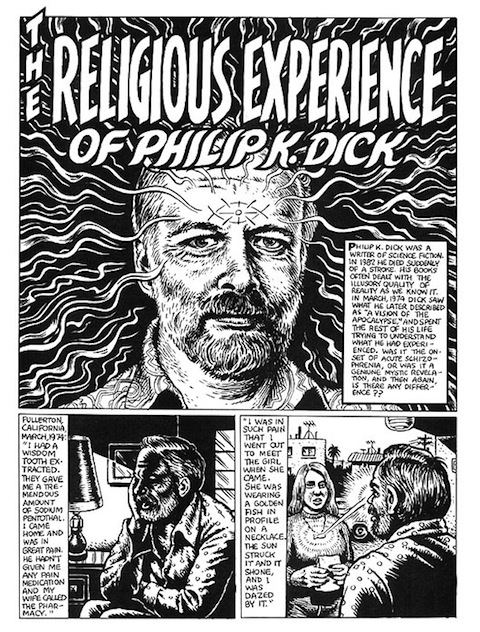
“I saw God,” Fat states, and Kevin and I and Sherri state, “No, you just saw something like God, exactly like God.” And having spoke, we do not stay to hear the answer, like jesting Pilate, upon his asking, “What is truth?”
–Philip K. Dick, VALIS
In the months of February and March, 1974, Philip K. Dick met God, or something like God, or what he thought was God, at least, in a hallucinatory experience he chronicled in several obsessively dense diaries that recently saw publication as The Exegesis of Philip K. Dick, a work of deeply personal theo-philosophical reflection akin to Carl Jung’s The Red Book. Whatever it was he encountered—Dick was never too dogmatic about it—he ended up referring to it as Zebra, or by the acronym VALIS, Vast Active Living Intelligence System, also the title of a novel detailing the experiences of one very PKD-like character with the improbable name of “Horselover Fat.”
LSD-triggered psychotic break, genuine religious experience, or something else entirely, whatever Dick’s encounter meant, he didn’t let the opportunity to turn it into art slip by him, and neither did outsider cartoonist and PKD fan Robert Crumb. In issue #17 of the underground comix magazine Weirdo, Crumb narrated and illustrated Dick’s meeting with a divine intelligence in the appropriately titled “The Religious Experience of Philip K. Dick.” It was eventually collected in the edition, The Weirdo Years by R. Crumb: 1981-’93. (See the comic in motion in the awkward, amateur video above.) The comic quotes directly from Dick’s telling of the event, which began with a wisdom tooth extraction and was ultimately triggered by a golden Christian fish symbol worn around the neck of a pharmaceutical delivery girl. Most PKD fans will be familiar with the story, whether they treat it as gospel or not, but to see it illustrated with such empathetic intensity by Crumb is truly a treat.
If you only know Crumb as the creator of lascivious Rubenesque women and schlubby, druggy horndog hipsters (like Fritz the Cat), you may be surprised by these emotionally realist illustrations. If you know Crumb’s more serious work, like his take on the book of Genesis, you won’t. In either case, fans of Dick, Crumb, or—most likely—both, won’t want to miss this.
Related Content:
Download 14 Great Sci-Fi Stories by Philip K. Dick as Free Audio Books and Free eBooks
Josh Jones is a writer and musician based in Durham, NC. Follow him at @jdmagness


Horselover Fat, far from being an improbable pseudonym, actually makes perfect sense.
Phillip means Horselover.
Dick is German for Fat.
Get it?
Thanks, Dennis. I’m hip. I didn’t write “improbable pseudonym.” I wrote “improbable name.”
Dick denied EVER taking LSD. His paranoid fantasies were fueled by methamphetamine. There are several good biographies — perhaps you should read one.
What get’s me is how this absurd & very sad tale of PKD’s waning years is becoming “legitimized” through repeated telling’s in any number of publications and/or webzines, etc., etc..
He contributed so much more than this, and he should be remembered for that, rather than the psychotic episodes he struggled with.
P.D.s body of work is vast. Hooked by his early work, I don’t think it is possible to know why he had psychotic episodes or whether he had reached some other plane. His writing definitely takes readers into a variety of mindstates,depending on who is reading it. Anything else is not my business to guess.
Dick claimed, in an interview with Charles Platt (published in “Dream Makers”), to have taken LSD twice. He also said that the first acid trip was a major influence on The Three Stigmata of Palmer Eldritch.
Sounds a bit like possession. Maybe meth can create cracks in the mind for such a thing to happen without the will giving permission.
Oh.
What is the purpose of the asinine soundtrack? In fact why is there a need to have a soundtrack at all? Elevator music is a kind of platitudinous soma which is gradually beginning to permeate the entire world. Initially it spread to restaurants and shopping malls but now it is beginning to establish itself in documentaries and tv programmes of some intellectual content. As background noise it can be tolerable but when it features directly behind the narrator’s voice it is unacceptable. When it is as obnoxious as this particular piece of noise it deserves to be hosed down a drain.
Just to say sorry — I know this posting is totally insignificant except maybe to the composer of the music and because of that it is important I write this. It’s not the music I’ve been ranting about, it’s the employment of it in this particular piece. The music is very good and in fact it creates quite an atmosphere but having it play while the narrator is speaking is totally inappropriate.
Hear hear.